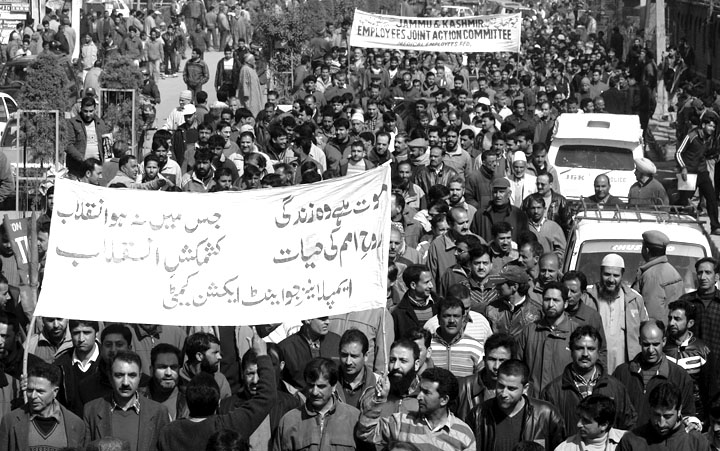The implementation of 6th pay commission recommendations may have brought relief to the state employees, but the financial implications and emerging disparities in pay scales are a challenge that J&K’s finance minister will have to find answers to, reports R S Gull
Grudgingly, the state government implemented the sixth pay commission recommendations. As employees wait for July, when the revised scales would be operational, panicky planners in finance ministry are desperate to identify resources for funding the whopping sum.“Given the limited resource base, we are basically waiting for the central government to chip in and then we expect some relief from 13th finance commission,” a senior official in the finance ministry said. “One way of fighting recession is to ensure the demand in the market does not slacken and for that government is consciously using its employees as a tool to pump in cash and I believe ours is a case worth consideration.”
But it is easier said than done. Implications jacked up the wage bill by Rs. 1600 crores – Rs. 1380 crores on salary and Rs. 220 crores on pension. For the current fiscal ending March 31, state’s wage bill is Rs. 6606 crores and in a year it would reach a whopping Rs. 8206 crores. It excludes Rs. 3800 crores of arrears that would be deposited in employees GP fund accounts with a moratorium over withdrawals for two years. The salary bill otherwise exhibits a steady yearly growth of three percent.
In J&K, the government is apparently the sole employer with a population of 3,85,265 employees including 3,49,265 in the government, 22,372 in PSUs and remaining 13130 in autonomous bodies and boards. In a state of over 11 million people slated to book an expenditure of Rs. 19070 in 2008-09, 3.85 lakh people (3.5 percent) taking away Rs. 6606 crores (35 percent) of the entire resource makes J&K a classical case of over-staffed establishment in India.
Employees have been demanding revised pay scales for a long time. After the coalition government took over they resorted to agitation. After an initial one day token strike, they went on strike for three consecutive days. This forced the government to come to table and the recommendations were approved by the government breaking its earlier record when it took a 22 days long paralysing strike by its employees to accept the fifth pay commission recommendations.
“It was a double edged weapon. You do not do it and you are doomed and you implement it you are gone,” said one senior officer who wishes to remain anonymous. Post-acceptance, however, many people within the government are raking up the issues that they think were skipped while rushing to please the employees.
One officer privy to development said the employees in their meetings prior to the acceptance had agreed that they would not insist on arrears if the new pay bands are implemented prospectively. “Many states have localised the sixth pay commission to manage balance between their needs and resources,” one officer said. “Barring Mizoram and Tripura all northern states have said they would implement it only if central government provides them the funds required for it. UP has implemented it prospectively saving the huge arrears thereof.”
“It is not the fault of employee if the establishment is over-staffed. They have their right to be well-paid,” said one expert on financial affairs. “The problem is that the government failed in linking enhanced pay scales with performance so that efficiency could have been increased”. Models for rewarding the best employee and punishing the non-performer are available and J&K desperately needs that, he believes. “A start in target variables could have been made in certain PSUs that have a possibility of revival,” he adds.
Now second thoughts are clearly emerging. Omar Abdullah who was hawking one job a family now says there are no berths in the government. In his brief speech while seeking vote on account, his finance minister Abdul Rahim Rather made arrears conditional to availability of resources.
Indications are clear a dispute will re-emerge. Even if the government keeps all commitments it has made, the new pay bands would create a bit of ruckus in July by the disparities it creates. A high level committee has already recommended rationalisation and merger of 17 pay scales into five, thus, reducing the number of pay scales from existing 30 to 18 to address anomalies in various ranks of the state government employees.


